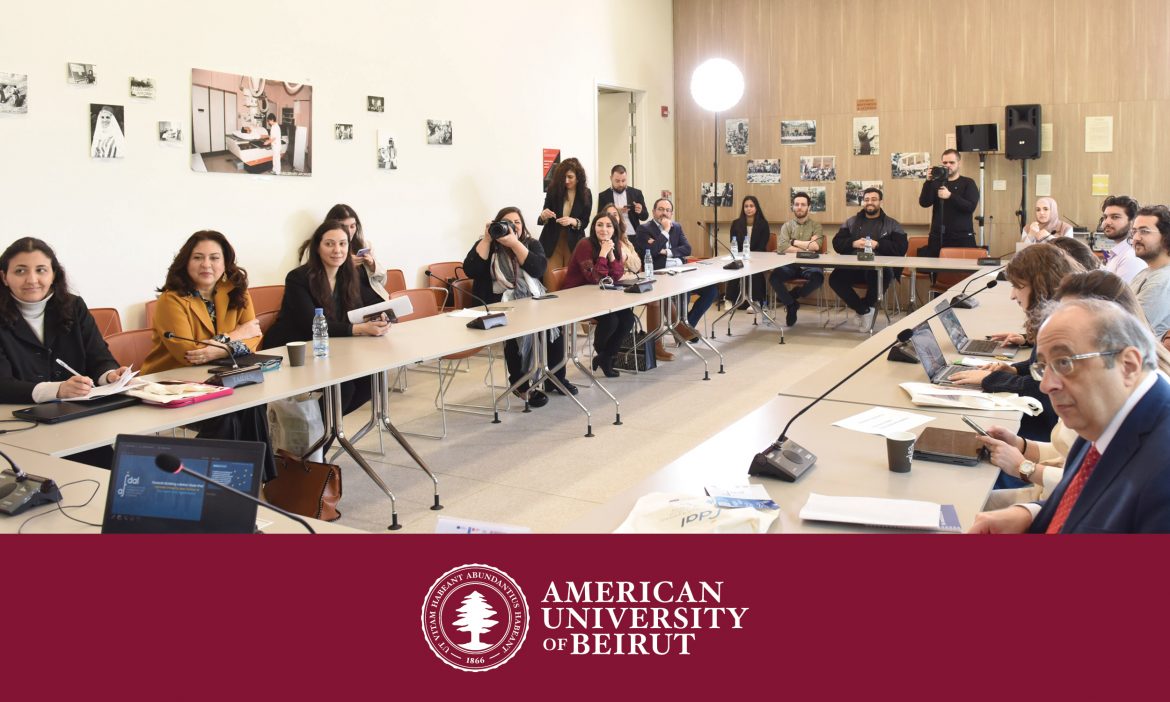The Good Governance and Citizenship Observatory (GGCO) at the American University of Beirut (AUB), in partnership with the Advocacy Force for Development and Anti-Corruption in Lebanon (AFDAL), hosted an open discussion titled “Unraveling the New Era of Public Procurement with University Students: Insights and Opportunities.” This event, held at AUB’s Asfari Institute for Civil Society and Citizenship, was centered around the Public Procurement Law 244/2021, which was enacted by the Lebanese parliament in 2021.
The discussion, aimed at engaging AUB students in active discourse on anti-corruption measures, highlighted the crucial role of public procurement as an instrument for safeguarding financial value and promoting the responsible management of public finances. The conversation also placed emphasis on the law’s significant potential to empower sustainability through green procurement, thereby impacting state-building, good governance, and economic growth positively.
Dr. Simon Kachar, GGCO’s founding director and a lecturer in political science at AUB, stressed in his opening remarks about the importance of such initiatives, highlighting the Observatory’s commitment to good governance, promoting active and responsible citizenship, and supporting constructive dialogue and collaboration between citizens and policymakers. Dr. Kachar highlighted that the Observatory stands as an advocate for democratic principles, encompassing the pillars of the promotion of citizenship, the rule of law, inclusion, and anti-corruption.
“These principles are regarded as essential pillars in achieving good governance and fostering a thriving society. Moreover, these democratic principles resonate deeply within the academic circle at AUB, where a longstanding tradition of nurturing such values is upheld,” Dr. Kachar added. “AUB’s intellectual and political discourse continues to be a vibrant and dynamic space, particularly for young minds, encouraging an exploration of diverse perspectives and ideas related to good governance and citizenship.”
The event featured esteemed panelists including Lamia Moubayed, non-resident senior international fellow at the Asfari Institute for Civil Society and Citizenship at AUB; Ghassan Moukheiber, former member of the parliament and anti-corruption senior legal consultant at the Anti-Corruption for Trust in Lebanon Project of the United Nations Development Programme; Basma Abdul Khalek, senior economist at the Institut des Finances Basil Fuleihan; and Layal Mostafa, co-founder at AFDAL; among others.
The dialogue covered a range of topics from the implications of the new public procurement law on safeguarding public funds to the transformative impact of the law on sustainability, economic growth, and governance. Each panelist brought unique insights, from the critical role of digitalization in fostering transparency and accountability, highlighted by Ghassan Moukheiber, to the pivotal importance of green procurement in advancing societal, economic, and environmental well-being, discussed by Basma Abdul Khalek.
Lamia Moubayed underscored the comprehensive nature of reform, extending beyond legislative adjustments to include structural, procedural, and institutional transformations; advocating for the adoption of e-procurement platforms and the promotion of SMEs to strengthen procurement practices.
The event concluded with a coffee break, offering participants an opportunity to engage with the panelists and AFDAL team members, and learn about AFDAL’s activities and membership opportunities.
This discussion marks a significant step toward enlightening the Lebanese youth about their potential role in advancing the anti-corruption agenda and shaping public perception in favor of transparency and integrity. The American University of Beirut and its partners remain committed to fostering an environment where good governance and anti-corruption efforts are at the forefront of educational discourse.
About the Good Governance and Citizenship Observatory (GGCO):
The Good Governance and Citizenship Observatory (the Observatory) is an initiative housed at the Asfari Institute for Civil Society and Citizenship at the American University of Beirut (AUB), dedicated to exploring the notion of citizenship in the Middle East and North Africa region and its interrelation with the process of good governance. The main purpose is to study the pillars shaping citizenship in the region, understand their dynamics, and disseminate the findings. The work of the Observatory focuses on three main pillars: good governance (including public sector reforms and education), migration, and laws and regulations. For more information visit the GGCO website.
About AUB
Founded in 1866, the American University of Beirut bases its educational philosophy, standards, and practices on the American liberal arts model of higher education. A teaching-centered research university, AUB has more than 750 full-time faculty members and a student body of over 8000 students. AUB currently offers more than 120 programs leading to bachelor’s, master’s, MD, and PhD degrees. It provides medical education and training to students from throughout the region at its Medical Center that includes a full-service 365-bed hospital.
Stay up to date on AUB news and events.
aub.edu.lb |Facebook |X

